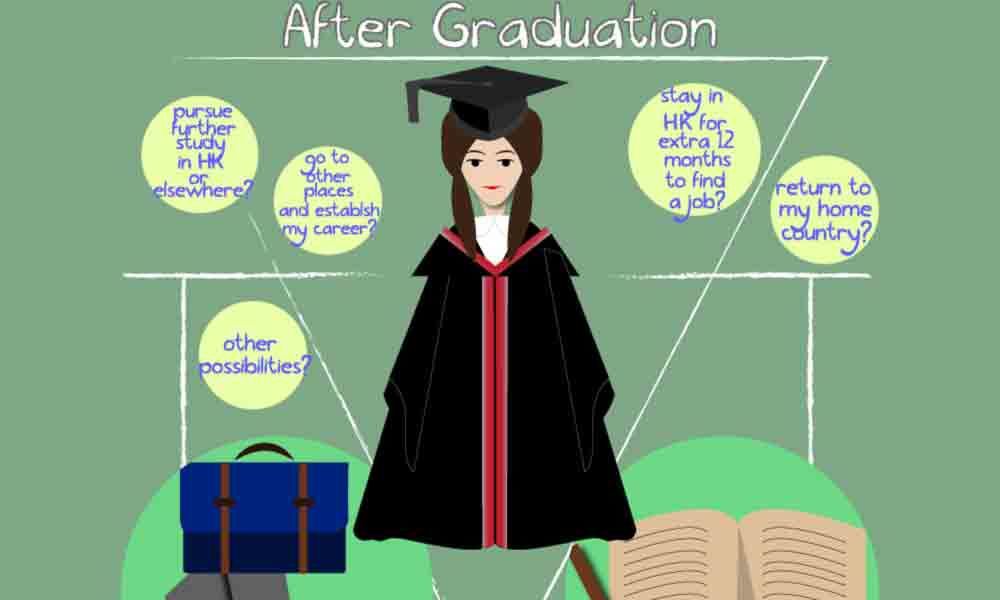Career options after graduation

It is surprising indeed that not enough discussion or reference is available about career planning after 10+2+3 or 4 or 5 (as in some cases it takes 4/5 years to graduate) whereas it is very easy to find guidance as what to do after 10+2. This article is an attempt to fill this gap.
It is surprising indeed that not enough discussion or reference is available about career planning after 10+2+3 or 4 or 5 (as in some cases it takes 4/5 years to graduate) whereas it is very easy to find guidance as what to do after 10+2. This article is an attempt to fill this gap.
As a matter of fact for all students, completing H.S.C. and then graduation, are two major milestones in their lives. However in terms of choices both the stages differ strikingly. When you have just completed H.S.C., you're mostly still into your teens, not in a very strong position to take independent decision and possibly not fully aware of doors (read choices) that are open for you. In such a position it is not surprising to find students who have to choose a path without an assessment of what the future holds for them. Of course, the future can never be predicted fully, but it is good that we try to design it.
When you are a graduate you are a grown up adult, with a wider perspective of the world within and around you .Your personality has become relatively mature and it is easier to form an independent opinion and chart a path for yourself. Another big difference is that while after 10+2, a student in most of the cases will think of further studies only (which precisely means choosing the course of study for graduation viz. engineering, medical, commerce, architecture, designing, pharmacy, agriculture, computer applications etc.) after graduation though one may choose to go for higher studies, there are also many other paths to choose from.
Broadly, following are the options or paths available when you're done with your graduation-
1. Pursuing further studies
2. Preparing for/appearing in All India Services
3. Seeking a job through other competitive examinations
4. Seeking a career in armed forces
5. Exploring instant job opportunities
Each of the above has been dealt with in detail below with an idea to help our readers to evaluate the choices.
Pursuing further studies: When you choose to continue your study after graduation, you are again flooded with options. You may go for a postgraduate degree or a diploma course. Based on your eligibility and financial situations, you may have to take a call whether you want to join a top graded institute or will be happy to join any other institute also. Another decision which has more significance will be about the subject to be taken for your postgraduate studies.
You may have been a science student but may want to change your track now. This is quite common. Many students who have done engineering (B.E. or B. Tech), instead of pursuing M.E. or B.Tech.. Decide to go for M.B.A. (Master of Business Administration). Even biotechnology and medical science graduates have been found to pursue management education at postgraduate level. The advantage with courses like M.B.A. and M.S.W. (Master of Social Work) is that these are open to graduates of all disciplines and has wide availability. Same is the case with a degree in law.
A law degree (L.L.B) can be pursued only after graduation in any subject (we're not talking of 5 years integrated courses possible after 10+2) though in its nature it is a graduate qualification. This freedom is restricted and is not applicable in cases of postgraduation in all the subjects. For example if an arts graduate suddenly develops interest in physics, she or he will not be allowed to join M.Sc. in physics.
So you have to check if you are eligible to make the transition. But before that more probing questions need to be answered such as what is your reason for wanting to change the subject. Is it your genuine interest in the subject, does it offer better job opportunities or you simply want a subject which is easier to sail through. In certain cases people choose a different subject for postgraduation as they want to keep this as an optional subject in civil services examination.
After graduation, doing Bachelor of Education (B.Ed.) is a good idea for those willing to take up a career in teaching up to secondary level. Post-graduate/diploma studies may be pursued in Indian and foreign languages as well.
If you're research oriented then you'll need a postgraduate degree before you could enrol for a Ph.D.
Whatever subject you choose for your postgraduation, you'll have to take a decision regarding the institute from where you want to do this course. For premier institutes like IIMs, IITs, IISc, and IIITs etc. the competition is intense. You've to take into account your finances because moving to another city will carry additional expenditure. Those who want to go abroad for their Masters will need to plan early taking into consideration various requirements like visa, etc.
Those who have graduated with qualifications like M.B.B.S or B.V.Sc. are considered fully equipped to take up a job or start practicing. However if they choose to specialize, post-graduation is the option for them.
Long and short term vocational diploma courses can also be undertaken after graduation. Make sure that the diploma has a value and it is intended to fulfil the purpose for which you've chosen it. Few examples of diploma courses are-jewellery designing, computer networking, web designing, training and development, translation, hotel management etc.














